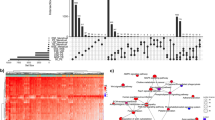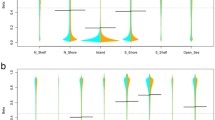Abstract
Purpose
Endometriosis is a gynecological disease that causes the uterine lining to appear in other organs outside the uterus. As DNA methylation has an important role in this disorder, its profiling can reveal new information to improve the diagnosis and treatment of endometriosis patients.
Methods
We conducted a genome-wide methylation profiling of ectopic and eutopic endometrial tissues from women with and without endometriosis using Infinium Human Methylation 450K BeadChip arrays. DNA methylation samples were collected from nine ectopic and nine eutopic endometrial tissues of endometriosis and six endometrial tissues of healthy controls.
Results
Correlation heatmaps and the principal component analysis divided the samples into two clusters, one consisting of all ectopic samples and the other consisting of both eutopic and control samples unexpectedly without segregation between them. The assay identified a group of methylated genes that were overrepresented in biological processes, including abnormality in signaling, development, and adhesion of cells. Pathway analysis revealed disruption in HTLV infection pathways, PI3K-Akt, oxytocin, and relaxin signaling. Moreover, we found eutopic lesions are strongly associated with autoimmune disease.
Conclusions
Our results confirmed the role of DNA methylation alternations in endometriosis development and pathogenesis. Our finding suggests aberrant DNA methylation can activate several signaling pathways including PI3k-AKT signaling, relaxin, and oxytocin which are associated with the pathogenesis of endometriosis.







Similar content being viewed by others
References
Barton-Smith P, Ballard K, Kent A. Endometriosis: a general review and rationale for surgical therapy. Reviews in Gynaecological and Perinatal Practice. 2006;6(3–4):168–76.
Aznaurova YB, Zhumataev MB, Roberts TK, Aliper AM, Zhavoronkov AA. Molecular aspects of development and regulation of endometriosis. Reproductive biology and endocrinology: RB&E. 2014;12:50.
Baranov VS, Ivaschenko TE, Liehr T, Yarmolinskaya MI. Systems genetics view of endometriosis: a common complex disorder. European Journal of Obstetrics & Gynecology and Reproductive Biology. 2015;185:59–65.
Hadfield R, Mardon H, Barlow D, Kennedy S. Delay in the diagnosis of endometriosis: a survey of women from the USA and the UK. Hum Reprod. 1996;11(4):878–80.
Oral E, Arici A. Pathogenesis of endometriosis. Obstet Gynecol Clin N Am. 1997;24(2):219–33.
Simpson JL, Elias S, Malinak LR, Buttram VC. Heritable aspects of endometriosis: I. Genetic studies. Am J Obstet Gynecol. 1980;137(3):327–31.
Izawa M, Taniguchi F, Harada T. Epigenetics in endometriosis. In: Endometriosis. Berlin: Springer; 2014. p. 107–23.
Guo S-W. Epigenetics of endometriosis. Mol Hum Reprod. 2009;15(10):587–607.
Deaton AM, Bird A. CpG islands and the regulation of transcription. Genes Dev. 2011;25(10):1010–22.
Brenet F, Moh M, Funk P, Feierstein E, Viale AJ, Socci ND, et al. DNA methylation of the first exon is tightly linked to transcriptional silencing. PLoS One. 2011;6(1):e14524.
Xue Q, Lin Z, Cheng Y-H, Huang C-C, Marsh E, Yin P, et al. Promoter methylation regulates estrogen receptor 2 in human endometrium and endometriosis. Biol Reprod. 2007;77(4):681–7.
Xue Q, Lin Z, Yin P, Milad MP, Cheng Y-H, Confino E, et al. Transcriptional activation of steroidogenic factor-1 by hypomethylation of the 5′ CpG island in endometriosis. J Clin Endocrinol Metab. 2007;92(8):3261–7.
Wu Y, Halverson G, Basir Z, Strawn E, Yan P, Guo S-W. Aberrant methylation at HOXA10 may be responsible for its aberrant expression in the endometrium of patients with endometriosis. Am J Obstet Gynecol. 2005;193(2):371–80.
Izawa M, Taniguchi F, Uegaki T, Takai E, Iwabe T, Terakawa N, et al. Demethylation of a nonpromoter cytosine-phosphate-guanine island in the aromatase gene may cause the aberrant up-regulation in endometriotic tissues. Fertil Steril. 2011;95(1):33–9.
Eyster KM, Boles AL, Brannian JD, Hansen KAJF. DNA microarray analysis of gene expression markers of endometriosis. Ferti Steril. 2002;77(1):38–42.
Arimoto T, Katagiri T, Oda K, Tsunoda T, Yasugi T, Osuga Y, et al. Genome-wide cDNA microarray analysis of gene-expression profiles involved in ovarian endometriosis. Int J Oncol. 2003;22(3):551–60.
Nasu K, Kawano Y, Tsukamoto Y, Takano M, Takai N, Li H, et al. Aberrant DNA methylation status of endometriosis: epigenetics as the pathogenesis, biomarker and therapeutic target. J Obstet Gynaecol Res. 2011;37(7):683–95.
Borghese B, Barbaux S, Mondon F, Santulli P, Pierre G, Vinci G, et al. Research resource: genome-wide profiling of methylated promoters in endometriosis reveals a subtelomeric location of hypermethylation. Mol Endocrinol. 2010;24(9):1872–85.
Naqvi H, Ilagan Y, Krikun G, Taylor HS. Altered genome-wide methylation in endometriosis. Reprod Sci. 2014;21(10):1237–43.
Yamagata Y, Nishino K, Takaki E, Sato S, Maekawa R, Nakai A, et al. Genome-wide DNA methylation profiling in cultured eutopic and ectopic endometrial stromal cells. PLoS One. 2014;9(1):e83612.
Sandoval J, Heyn H, Moran S, Serra-Musach J, Pujana MA, Bibikova M, et al. Validation of a DNA methylation microarray for 450,000 CpG sites in the human genome. Epigenetics. 2011;6(6):692–702.
Aryee MJ, Jaffe AE, Corrada-Bravo H, Ladd-Acosta C, Feinberg AP, Hansen KD, et al. Minfi: a flexible and comprehensive Bioconductor package for the analysis of Infinium DNA methylation microarrays. Bioinformatics. 2014;30(10):1363–9.
Kolde R, Märtens K, Lokk K, Laur S, Vilo J. seqlm: an MDL based method for identifying differentially methylated regions in high density methylation array data. Bioinformatics. 2016;32(17):2604–10.
Wickham H. ggplot2. Wiley Interdisciplinary Reviews: Computational Statistics. 2011;3(2):180–5.
Edgar R, Tan PPC, Portales-Casamar E, Pavlidis P. Meta-analysis of human methylomes reveals stably methylated sequences surrounding CpG islands associated with high gene expression. Epigenetics Chromatin. 2014;7(1):28.
Tamaresis JS, Irwin JC, Goldfien GA, Rabban JT, Burney RO, Nezhat C, et al. Molecular classification of endometriosis and disease stage using high-dimensional genomic data. Endocrinology. 2014;155(12):4986–99.
Lokk K, Modhukur V, Rajashekar B, Märtens K, Mägi R, Kolde R, et al. DNA methylome profiling of human tissues identifies global and tissue-specific methylation patterns. Genome Biol. 2014;15(4):3248.
Rahmioglu N, Drong AW, Lockstone H, Tapmeier T, Hellner K, Saare M, et al. Variability of genome-wide DNA methylation and mRNA expression profiles in reproductive and endocrine disease related tissues. Epigenetics. 2017; (just-accepted).
Grandi G, Mueller MD, Papadia A, Kocbek V, Bersinger NA, Petraglia F, et al. Inflammation influences steroid hormone receptors targeted by progestins in endometrial stromal cells from women with endometriosis. J Reprod Immunol. 2016;117:30–8.
Barbosa CP, De Souza AB, Bianco B, Christofolini D. The effect of hormones on endometriosis development. Minerva Ginecol. 2011;63(4):375–86.
Samadieh Y, Favaedi R, Ramezanali F, Afsharian P, Aflatoonian R, Shahhoseini M. Epigenetic dynamics of HOXA10 gene in infertile women with endometriosis. Reprod Sci. 2018;1933719118766255.
Dyson MT, Roqueiro D, Monsivais D, Ercan CM, Pavone ME, Brooks DC, et al. Genome-wide DNA methylation analysis predicts an epigenetic switch for GATA factor expression in endometriosis. PLoS Genet. 2014;10(3):e1004158.
Saare M, Modhukur V, Suhorutshenko M, Rajashekar B, Rekker K, Sõritsa D, et al. The influence of menstrual cycle and endometriosis on endometrial methylome. Clin Epigenetics. 2016;8(1):2.
Osaki M, Ma O, Ito H. PI3K-Akt pathway: its functions and alterations in human cancer. Apoptosis. 2004;9(6):667–76.
Slomovitz BM, Coleman RL. The PI3K/AKT/mTOR pathway as a therapeutic target in endometrial cancer. Clin Cancer Res. 2012;18(21):5856–64.
Fresno JV, Casado E, Cejas P, Belda-Iniesta C, González-Barón M. PI3K/Akt signalling pathway and cancer. Cancer Treat Rev. 2004;30(2):193–204.
Hers I, Vincent EE, Tavaré JM. Akt signalling in health and disease. Cell Signal. 2011;23(10):1515–27.
Liang J, Slingerland JM. Multiple roles of the PI3K/PKB (Akt) pathway in cell cycle progression. Cell Cycle. 2003;2(4):336–42.
IJBeBA-GS B. Pathways of O-glycan biosynthesis in cancer cells. 1999;1473(1):67–95.
MJBeBA-GS F. Roles of mucin-type O-glycans in cell adhesion. Biochim Biophys Acta. 2002;1573(3):394–405.
Acknowledgments
The authors have great appreciations for the kind support of Professor Saadi Khochbin in the generation of the methylome data. We also thank the gynecologist Dr. Fariba Ramazanali for preparing samples.
Funding
This project was partially supported by the Royan Institute (Grant No. 96000045).
Author information
Authors and Affiliations
Corresponding author
Ethics declarations
Conflict of interests
The authors declare that they have no conflicts of interest in the research.
Additional information
Publisher’s note
Springer Nature remains neutral with regard to jurisdictional claims in published maps and institutional affiliations.
Maryam Shahhoseini is a co-corresponding author.
Rights and permissions
About this article
Cite this article
Barjaste, N., Shahhoseini, M., Afsharian, P. et al. Genome-wide DNA methylation profiling in ectopic and eutopic of endometrial tissues. J Assist Reprod Genet 36, 1743–1752 (2019). https://doi.org/10.1007/s10815-019-01508-8
Received:
Accepted:
Published:
Issue Date:
DOI: https://doi.org/10.1007/s10815-019-01508-8




